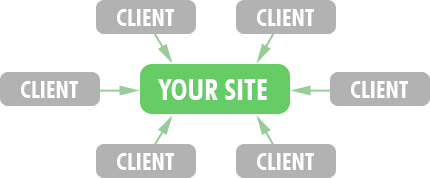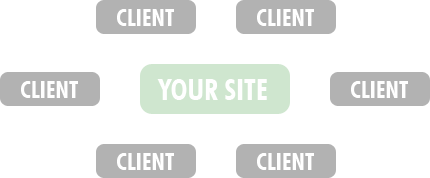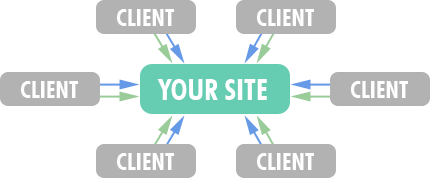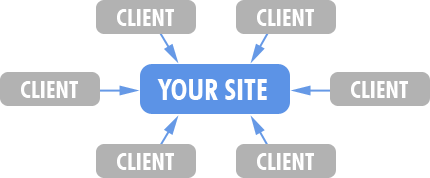
Black Hat or White Hat SEO? It's Time to Ask Better Questions
Since the Wild West days of the late 1990s, SEOs have been grouped into two camps – the “black hats” and the “white hats”. Over time, these distinctions have become little more than caricatures, cartoon villains and heroes that only exist in our individual imaginations, usually embellished to suit our marketing agendas. Even when grounded in specific tactics, “black” vs. “white” is a lot like “conservative” vs. “liberal” – the definition changes with the year and every person you ask, and that definition almost always comes loaded with assumptions and judgments.
Unfortunately, too many business owners still choose their SEOs based on the hat they wear, even when that hat only comes out on sales calls. So, I’d like to ask some better questions. There are real strategic and tactical differences behind what we often think of as “white” and “black” hat SEO, and those differences are what you need to understand to make the right choices for your own business.
This Isn’t About Ethics
While we generally think of ourselves as “white hat” here at SEOmoz, I’m going to put ethics aside temporarily for this post. I will assume that, when we say “black hat”, we’re not talking about outright illegal behavior (like hacking into someone’s site). We’re talking about willfully violating Google’s rules to improve your ranking. While I do believe there are ethical implications to cheating the system and harming search quality, this post is intended to be an honest look at the real choices you face when choosing an SEO path.
(1) High-Value or Low-Value?
The first question is – are you going to pursue “high-value” or “low-value” tactics? I don’t want to replace one hopelessly vague duality with another one, so let me define my terms. By “value”, I mean the value that these tactics provide to site and search visitors. We sometimes call low-value tactics “spam”. It’s not usually illegal and it’s not always even unethical (depending on your point of view), but it’s always done specifically for SEO purposes.
Here’s an example – linking all of your client’s sites back to your own site with keyword-loaded footer links. I wouldn’t call this unethical, but it doesn’t add value and, frankly, it’s just too easy. Google knows this, and they naturally devalue those links now (in extreme cases, they might even penalize the target site).
Ironically, “low-value” tactics are often considered to be a value to people who are trying to gain ground as cheaply as possible. Practically, people often underestimate the time these tactics take and overestimate the return on investment. Low-value tactics tend to fade quickly. As Google gets more aggressive, low-value tactics are also getting riskier (see Question #2).
There’s a more fundamental problem, though, in my opinion – low-value tactics don’t build anything toward the future. Once they fail, and they usually do, you have to start over and chase some new low-value tactic. Here’s an example – let’s say you get links back from all of your clients in low-value footer text, and your one-way link network looks something like this:

Link “juice” is flowing, and all signs are green. Then, one day, Google pulls the plug on this particular low-value tactic. What are you left with?

You’re not left with much, because these links never had real value beyond SEO. Imagine, though, that those links carried not only authority (in green), but traffic (in blue):

Now, let’s say Google changes the rules, and you lose the ranking power of those links. The links still have value, because they’re still carrying visitors to your site:

The picture may not look exactly the same, and the traffic quantity and quality have changed, but you’re not dead in the water. I know I’m oversimplifying this, but I just want to make the point perfectly clear. If you play the game purely for SEO, and you lose, you lose everything. If you build something of value that actually attracts visitors and then the rules change, you’ve still built something.
(2) High-Risk or Low-Risk?
The second question you need to ask yourself is: How much risk are you willing to accept? Don’t just smile and nod and tell me about how you’re a “risk-taker” – I’ve heard plenty of people tell their SEO companies to “Go for it!” only to be reduced to sobbing in the corner when their strategy crashed and burned months later. This is a time for brutal honesty. Can you live with the risk of a severe penalty, including being totally removed from the Google index?
High-risk SEO is like high-risk investing – yes, there can be high reward, if you know what you’re doing, but for every 1 winner at this game there are 99 companies that close their eyes, cover their ears, and whistle their way into disaster. If what you’re hearing from your SEO company sounds too good to be true, ask more questions. As Paddy Moogan’s recent post pointed out, your risk is not someone else’s to take.
To make matters worse, I think that many so-called “black-hat” tactics, and even some gray-hat tactics, are much riskier than they used to be. There was a time when, if you played the game too hard, you got a slap on the wrist and had to start over. You’d be set back a few weeks, but you’d also have made a lot of money in the months leading up to that. I’m not saying it’s right, but let’s at least be honest about the past.
Fast-forward to 2013, and look at an update like Penguin – almost a year after the original Penguin, we’ve still heard very few public recovery stories. The ones I’ve heard in private have almost always involved a massive culling of links (the good with the bad, in many cases) and took months. That’s months with major revenue loss, and this is from big agencies who have resources and connections that many business don’t have access to.
Even semi-innocent tactics have been hit hard. Fairly recently, you could spin out a bunch of city/state pages with a few long-tail keywords and do pretty well. Was it a high-quality tactic? No, but it’s hardly the essence of evil. Worst case, Google would start ignoring those pages, and you’d be out a few days of work. Then, along came Panda, and now your entire site can suffer for quality issues. The price of mistakes is getting higher, and Google is getting more punitive.
I’m not here to tell you what to do, but this is not just a “white-hat” sermon. I’ve studied Google’s movements a lot in the past year, and I sincerely believe that the risk of manipulative tactics has increased dramatically. I also believe that it’s only the beginning. So, if you’re going to play the game, make sure you can afford to lose.
It's almost important to understand that every tactic carries risk, especially if you fail to diversify. When I hear a company say "Our clients are never affected by updates, because we only use Google-approved methods!", then I know that company has only been in business for six months. Sooner or later, white-hat or black-hat, the rules will change. You could be sparkling white and still get hit by things like paid inclusion, SERP layout changes, SERP feature changes, etc. The time for SEO hubris is over.
(3) Short-Term or Long-Term?
Finally, I think you have to consider whether you’re in this for the long haul or just trying to make a short-term play. For example, let’s say you’re building an affiliate site to sell accessories for the Samsung Galaxy S4 (which was just announced while I was writing this post). The smartphone market moves fast, and as an affiliate in this space, you’re facing a few realities:
- You probably don’t have a lot of money to invest up-front
- You need to get your traffic rolling quickly
- Your peak opportunity may only last 6-12 months
Again, I’m not making a moral judgment, but this is a very different kind of business situation, practically speaking. You may not have time to build epic content or spend six months building up a social following, and the consequences of getting burned a year from now may be fairly small. So, if you know your business is short-term, you can take risks that other people can’t.
The problem, I think, is that too many long-term businesses think this way: “I can’t afford to spend money”, “I don’t have time to get moving”, “I need results now!” So, you dive into low-value tactics to get moving quickly and cheaply. Even if you never get smacked down by Google, the reality is that these tactics tend to be short-lived – they fade or burn out, and you’ve got to start again. So, you’re constantly in a cycle of chasing the next low-value trend.
This may be attractive at first, to get out the gate, but over time I think it’s a losing proposition. If you never build anything that lasts, you’re always stuck making repairs. If you invest early, those investments tend to pay out, and you can build on them. I’ve seen this so many times with content over the past few years – I invest in a piece that doesn’t quite live up to my immediate expectations (traffic-wise, social-wise, etc.), and I’m about to throw in the towel, when weeks or months later, it takes off and just keeps running. Once it’s running, you get to go along for the ride. Without that investment, you’re always pushing.
So, What’s Right for You?
I can't tell you how to run your business. I just want you to ask yourself (and your vendors) the hard questions. Are "low-value" tactics actually saving you money? How much risk are you really willing to take? Is your #1 priority to get up and running quickly and cheaply, or are you trying to build a real, long-term business? If the best your provider can do is show you their hat, and they can't help you answer these questions, then move on – it doesn't matter what color that hat is.




Comments
Please keep your comments TAGFEE by following the community etiquette
Comments are closed. Got a burning question? Head to our Q&A section to start a new conversation.